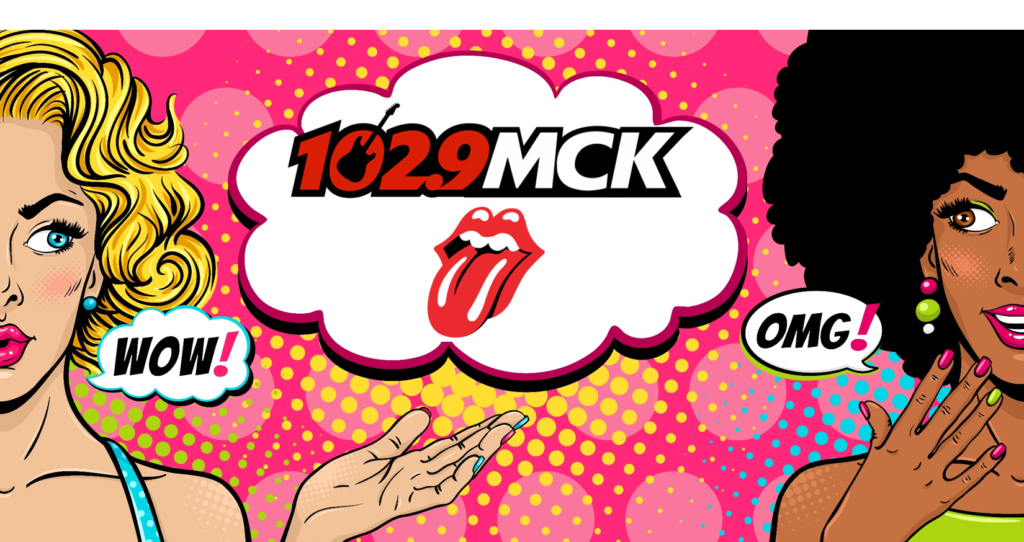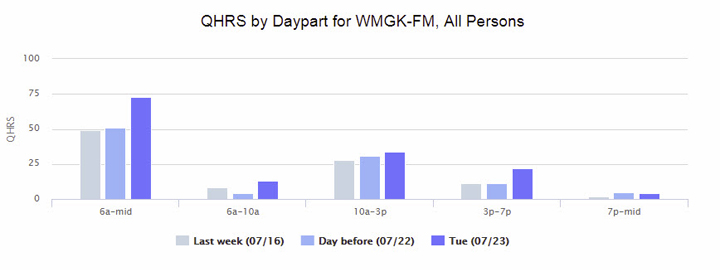
As hard as it is to believe, we are rapidly coming up on two years of COVID and its disruptive effects. Sometimes, it’s hard to remember when we weren’t dealing with the many tentacles of this pandemic.
And that’s why we have “Throwback Thursday” on JacoBLOG, a chance to turn back the clock, hoping to learn important lessons from radio’s past. This one goes back to July of 2019, during the last pre-pandemic summer we’ve experienced. We’re visiting Philadelphia, focusing on Beasley Media Group’s WMGK, the city’s Classic Rock station.
We hope that as COVID ebbs, and our lives return to some degree of “normal,” that old muscle memory for stunts, street promotion, and being in the moment comes back too. That’s the story behind today’s post.
Interestingly enough, the hard-working team at MGK, led by programmer extraordinaire Bill Weston, continues to operate at a high level. Earlier this week, they were nominated for one of those coveted NAB Crystal Awards. Congrats to everyone at the station for maintaining that level of excellence even in troubled times. – FJ
July 2019
The headline of today’s post might just have well as been:
Radio Rediscovers That Good Programming Wins In PPM
In case you missed it, WMGK (Beasley’s Classic Rock station in Philly) did the unthinkable this week – they threw out their usual format, put their call letters on the shelf, and for one day became wall-to-wall Rolling Stones under their “new” moniker – WMCK. The day-long tribute to Mick Jagger and the Stones in honor of the band’s concert at the Lincoln Center wouldn’t have raised a lot of radio eyebrows, except for one thing:
It killed in PPM.
How do we know that? It’s a little known fact that Nielsen and Media Monitors produce next day ratings in PPM markets. Called “Audio Overnights,” the service allows broadcasters to actually see results of what they did yesterday.
Thanks to Inside Radio, the results of WMGK’s (or WMCK’s) Stones stunt was not just impressive – it was spectacular. And it should prove to be a philosophical game-changer for programmers in PPM markets who ascribe to the 5-word philosophy of boredom:
Set it and forget it.
Like folklore, passed from generation to generation, it became a radio programming truth that blandness, banality, and sameness was the way to win in PPM. Stations that dropped in “Oh wow!” elements became rarities in metered markets, and “good programming” became synonymous with tight playlists, numbing consistency, and music scheduling prowess.
That’s not programming.
Programming is what PD Bill Weston and his live & local WMGK staff pulled off on Tuesday. And perhaps the most remarkable thing about this stunt is not that it worked, but that other PDs were surprised at the results.
And lest you think the entire day was simply one great Stones song after another, “WMCK” flipped all its daily benchmark features to the Stones-inspired theme of the day. “Breakfast With The Beatles” became “Scones With Stones,” for example, keeping the theme of the day consistent – while showing the station has a sense of humor.
The WMCK stunt worked, compared to an average Tuesday (or the day before) on WMGK:

But Nielsen/Media Monitors proved another Classic Rock truth – the format is often as popular with younger demos as it is with those who grew up with an iconic band like the Stones. On WMCK Day, 25-34s were the leading demo, coinciding with all those Millennials paying big bucks to see a bunch of 75 year-old rockers prancing around the stage.
Not surprisingly, Weston integrated his staff of knowledgeable, trusted sherpas – his airstaff – to provide coverage, color, context, and excitement. Andre Gardner broadcast live from the Lincoln Center, while Debbi Calton wrote an extensive blog/review of the show that appeared on the station’s website.

So, let’s review 7 lessons learned from WMGK’s Stones stunt:
1. Music and culture are lifestyles – not demographics – As we continue to see in Nielsen ratings – both diary and PPM, Classic Rock isn’t just a Baby Boomer format. But to grasp that reality, simply attend an Elton John, Who, Aerosmith….or Stones concert when they come to your town and “research” the crowd. By the way, Nielsen Music’s webinar on Wednesday confirmed the appeal of Classic Rock music to America’s youth. It’s “pan-generational appeal” is underscored by the fact than fans of Rock are 34% Millennials, 33% Gen Xers, and 28% Baby Boomers (and older). Weston expanded his station’s demographic appeal by speaking to the larger cultural moment – rather than being tethered to a format.
2. Live & local works – Every time I hear a pundit extol the virtues of voicetracking, while diminishing broadcast radio’s ability to personalize music with a life airstaff, I shake my head. On Tuesday, WMCK proved that radio can be more interesting, fun, and compelling than a Stones channel on Pandora. The reason why DeBella, Gardner, Calton, and the rest of the MGK air aces made this stunt work is because of their day-in-day-out connection between the station, Philly, and the hometown audience.
3. Capturing the local zeitgeist – It may be Programming 101, but it’s become all too rare.  Promotion/marketing gurus like Paige Nienaber preach the wisdom of radio being in the moment, talking about what the community is talking about. How risky was it to flip WMGK into an all-Stones station on Tuesday? In retrospect, it was a slam-dunk, but if it was that simple, why don’t more stations seize the moment?
Promotion/marketing gurus like Paige Nienaber preach the wisdom of radio being in the moment, talking about what the community is talking about. How risky was it to flip WMGK into an all-Stones station on Tuesday? In retrospect, it was a slam-dunk, but if it was that simple, why don’t more stations seize the moment?
4. Showing up – You’ve heard the old adage from Woody Allen: “80% of success is showing up.” That axiom also applies to radio. It’s not just enough to play “Shattered” and “Satisfaction” all day long. Showing up at Lincoln Center, having the airstaff attend and cover the concert, and having presence earn brand image points for a station like MGK. And apparently, it works in the ratings, too.
5. Online & on-air – A look at many station websites and apps reveals a world frozen in boring consistency. Oftentimes, radio fails to sync up its digital assets with its OTA programming. Calton’s review of the concert and the station’s graphic department made sure WMCK wasn’t just coming out of the speakers, but also out of screens.
6. Surprise, surprise – The best thing about Spotify, Pandora, and other pure-plays is that you can be the program director, assembling and arranging wonderful, personalized playlists. The worst thing is that you always know what’s coming. And that’s why the element of surprise may even play better among the younger demographics. We hear it in focus and LAB groups, and now you can see it in PPM. What the late WPLJ PD Larry Berger used to call “logged spontaneity,” programmers need to think beyond the boundary lines, walking that line between “oh wow” and “oh no.”
7. This isn’t just a Classic Rock thing – Today’s headline in Inside Radio indicates that Radio (capital R) is in dire need of a programming shakeup. At yesterday’s CRS 360° webinar, Country programmers Chris Huff and Joey Tack concurred their format is in a rut. Huff pointed to “a lot of sameness” in radio programming, while Tack posited that “We are going to have to break some rules that have been sacred because the audience is breaking them.” They should talk to Bill Weston.
Of course, none of this means that changing call letters, breaking format, and programming out of the box is something that radio can successfully pull off every day, much less every week.
But it’s also an affirmation the audience is looking for more from the radio they listen to. Joey Tack asked the question, “What can we deliver that they can’t get anywhere?”
Answer: WMCK
It’s time to start programming again.
Postscript: At the end of 2019 Debbi Calton hung up her headphones and called it a career. She was a2 26-year  veteran of MGK, and also had long stints at WYSP where I first met her.
veteran of MGK, and also had long stints at WYSP where I first met her.
Debbi wasn’t just a great midday jock – she was one of the best in the business at connecting with her audience and making them feel a part of her stations. I’ve seen tons of research for the station over the years, and no one has established a warmer relationship with her listeners and her community than Debbi Calton. – FJ
- In Radio, You Just Never Know - April 17, 2025
- The Secret To Making A Great Podcast (And Great Radio) - April 16, 2025
- I Read The (Local) News Today, Oh Boy! - April 15, 2025





If you guys ever decide to do a T-Shirt, I vote for this as the slogan:
FRONT: The best thing about Spotify, Pandora, and other pure-plays is that you can be the program director, assembling and arranging wonderful, personalized playlists.
BACK: The worst thing is that you always know what’s coming.
It’s a little wordy, Alan. 🙂
Actually, it totally apt. Thanks for engaging on this one.
Hey Fred,
I am sadly surprised by the lack of response to this important read.
I guess first, that’s why radio is struggling, isn’t it? The guard in charge doesn’t have anything to say about things like this. It hurts my heart and head. I program a different type of classic rocker here in Montana. It’s doing SO WELL and it breaks most of the classic rock rules. The reason I can even TRY this is because I was relentless for, literally YEARS about modernizing it, and I have a consultant, that actually listened to me and my vision and allowed me to do it.
Classic Rockers, purist classic rockers, will hardly be able to call themselves that in the very near future. They’re classic hits and oldies, no matter the fight they put up to keep their “coolness”. Programmers in the trenches have known for about 20 years what was happening in rock, but nobody would listen. Millenials, Gen X, we’ve been driving things for awhile, but we have a big ole booming generation before all of us that, in shear numbers alone, has been able to keep their hands in all the cookie jars. And now, we’re paying the price for being stuck in their generation.
As for the jocks being important. Ummmm, yeah! We’ve always known that, but to save the $, we were taken down to skeleton crews and NOW the big guys are having the epiphany that jocks matter. I can’t roll my eyes hard enough. I’m just going to say you get what you pay for, you get what you groom.
I sure wish more programming and managing types had taken the time to really hear what you were saying.
Thank you for always giving me a reason to think. I really appreciate what you do
Tammie, it’s always a joy to hear from you. When you “check in,” it’s a reminder I’ve actually written something that moved you.
Now I bet a lot of people would like to hear your station. Without great people, it’s all just run-of-the-mill playlists. You do, in fact, reap what you sow.
Thanks again for a great comment on a “rerun” post.
Rock and Roll .Baby